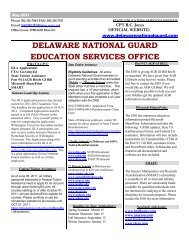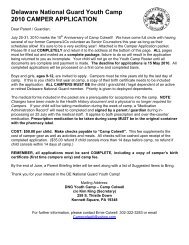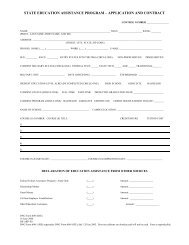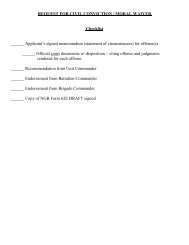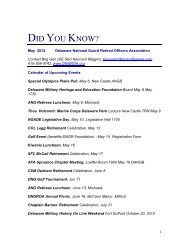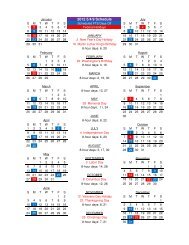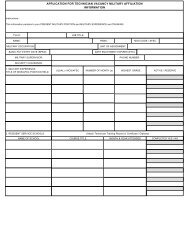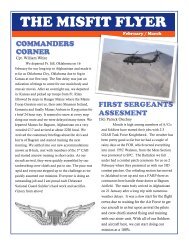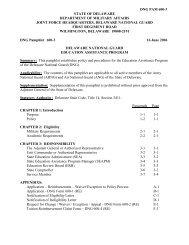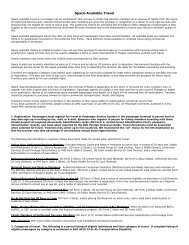NGR 600-101 - Delaware National Guard
NGR 600-101 - Delaware National Guard
NGR 600-101 - Delaware National Guard
You also want an ePaper? Increase the reach of your titles
YUMPU automatically turns print PDFs into web optimized ePapers that Google loves.
<strong>NGR</strong> <strong>600</strong>-<strong>101</strong> 1 October 1996<br />
as the Secretary of the Army may prescribe and under<br />
the provisions of this regulation.<br />
2-2. Federal recognition<br />
In order for a warrant officer to be concurrently ap-<br />
pointed as a Reserve warrant officer of the Army, the<br />
State action must be federally recognized. Federal<br />
recognition is the process which ensures that officers<br />
appointed by the States meet the qualifications re-<br />
quired for service in the Federal armed forces.<br />
23. Temporary Federal recognition<br />
a. Temporary Federal recognition may be extended<br />
to an officer who has been found qualified by a Federal<br />
Recognition Board (FRB) for appointment in the ARNG<br />
of a State pending receipt of permanent Federal<br />
recognition and appointment as a Reserve officer of<br />
the Army. Temporary Federal recognition may be<br />
withdrawn when necessary at any time. Unless<br />
sooner withdrawn or official orders issued granting<br />
permanent Federal recognition, temporary Federal<br />
recognition will automatically terminate six months after<br />
the effective date of the State appointment (Tile 32,<br />
United States Code, section 308). However, should<br />
the initial period of temporary Federal recognition expire<br />
due to administrative processing delays, through<br />
no fault of the applicant, a subsequent Federal<br />
Recognition Board must be convened to consider<br />
granting another six months period of temporary Federal<br />
recognition.<br />
b. Temporary Federal recognition is not applicableto<br />
the following:<br />
(7) Army Reserve warrant officers in the same<br />
grade and MOS.<br />
(2) ARNG warrant officers transferring between<br />
States in the same grade and MOS.<br />
(3) ARNG warrant officers transferring from the<br />
Inactive <strong>National</strong> <strong>Guard</strong>.<br />
2-4. Appointment Policy<br />
a. The appointment of warrant officers in the ARNG<br />
is a function of the State concerned. Upon appoint-<br />
ment in the ARNG of a State and subscribed to an oath<br />
of office, a soldier assumes a State status under which<br />
to serve. Such a soldier acquires a Federal status<br />
when they are Federally recognized by the Chief,<br />
NGB, and appointed as a Reserve of the Army.<br />
6. The effective date of Federal recognition is the<br />
date the warrant officer executes the Oath of Office,<br />
NGB Form 337.<br />
c. Federal recognition will continue in effect as long<br />
as the warrant officer continues to meet the require-<br />
ments of the grade and position, or until recognition is<br />
withdrawn in accordance with regulations or as other-<br />
wise required by law.<br />
d. Chapter 9 of this regulation outlines the person-<br />
nel actions requiring examinations for Federal recog-<br />
nition and for the conduct of a Federal Recognition<br />
Board.<br />
2-5. Appointment as a Reserve Warrant Offl-<br />
cer of the Army<br />
Warrant Officers who are federally recognized in a<br />
particular grade and branch shall be tendered an ap-<br />
4<br />
pointment in the same grade as Reserve warrant offi-<br />
cers of the Army with assignment to the Army <strong>National</strong><br />
<strong>Guard</strong> of the United States (ARNGUS). as provided in<br />
Title 10. United States Code, Section 1221 1. A Re-<br />
serve appointment is for an indefinite period and is not<br />
contingent upon continued Federal recognition (Title<br />
10, United States Code. Sections 1221 1 and 12213).<br />
a. Under such regulation as the Secretary of the<br />
Army may prescribe, warrant officers who have status<br />
as a Reserve Warrant Officer of the Army with assgn-<br />
ment to the ARNGUS may be transferred in grade to<br />
the United States Army Reserve (USAR). This action<br />
requires the consent of the Governor or other appro-<br />
priate authority of the State, Puerto Rico, Virgin Islands,<br />
Guam, or the District of Columbia <strong>National</strong> <strong>Guard</strong>, as<br />
applicable. Unless an ARNGUS warrant officer is<br />
discharged from the Reserve of the Army concurrent<br />
with withdrawal of Federal recognition IAW pertinent<br />
regulation, the officer will become a member of the<br />
USAR upon separation from the ARNG.<br />
b. Non-prior service applicant appointed in the<br />
ARNG as a warrant officer incurs a military service<br />
obligation IAW AR 135-91.<br />
2-6. Procurement sources<br />
The following personnel may apply for warrant officer<br />
appointment to fill authorized or projected position va-<br />
cancies. Applicants must meet the DA MOS proponent<br />
prerequisites as outlined in DA Circular 601 series<br />
(Warrant Officer Procurement Program).<br />
a. Former officers and warrant officers.<br />
b. Holders of Certificates of Eligibility, NGB Form<br />
89a. as provided in paragraph 2-17 of this regulation.<br />
The appointment must be for the same MOS as en-<br />
tered on the certificate unless the DA MOS proponent<br />
finds the applicant eligible for entry into the Warrant<br />
Officer Education System in the new MOS, and pro-<br />
vided the wise qualified.<br />
c. Graduates of the Warrant Officer Candidate<br />
School.<br />
d. Officers of other uniformed services.<br />
2-7. Eligibility criteria<br />
Soldiers found eligible by a DA MOS proponent to<br />
enter the appropriate Warrant Officer Basic Course<br />
and meeting the qualifications listed below may apply<br />
for appointment as an ARNG warrant officer candidate<br />
with subsequent appointment as a warrant officer. All<br />
waivers and exceptions to policy must be approved<br />
prior to appearance before a Federal recognition<br />
board for appointment.<br />
a. Assignment. A warrant officer must be as-<br />
signed to a warrant officer position vacancy in a Fed-<br />
erally recognized unit of the ARNG. The assignment of<br />
warrant officer candidates prior to appointment as a<br />
warrant officer is contained in Chapter 4 of this regula-<br />
\d<br />
d<br />
tion. 4<br />
6. Age.<br />
(7) Applicant must be at least age 18 and not<br />
have attained age 46 on the effective date on which<br />
Federal recognition is initially extended by the Chief,<br />
<strong>National</strong> <strong>Guard</strong> Bureau.<br />
(2) An applicant eligible for appointment to the<br />
grade of Chief Warrant Officer, W-2, under the provi-<br />
d<br />
b



